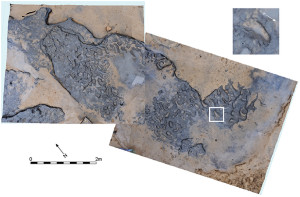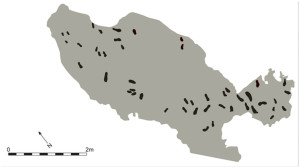In a thrilling discovery, detailed in a paper published February 7 in the scientific journal PLOS ONE, the earliest human footprints found outside of Africa appeared in May, in ancient sediment along the English coastline at low tide, near Happisburgh, in Norfolk.
The ocean washed them away, but not before they could be studied by scientists and preserved on video, which is scheduled to be shown as part of the new exhibit, Britain: One Million Years of the Human Story. The exhibit opens at the Natural History Museum in London on February 13, and continues through September 28, 2014.
The paper’s abstract is as follows:
Investigations at Happisburgh, UK, have revealed the oldest known hominin footprint surface outside Africa at between ca. 1 million and 0.78 million years ago. The site has long been recognised for the preservation of sediments containing Early Pleistocene fauna and flora, but since 2005 has also yielded humanly made flint artefacts, extending the record of human occupation of northern Europe by at least 350,000 years. The sediments consist of sands, gravels and laminated silts laid down by a large river within the upper reaches of its estuary. In May 2013 extensive areas of the laminated sediments were exposed on the foreshore. On the surface of one of the laminated silt horizons a series of hollows was revealed in an area of ca. 12 m2. The surface was recorded using multi-image photogrammetry which showed that the hollows are distinctly elongated and the majority fall within the range of juvenile to adult hominin foot sizes. In many cases the arch and front/back of the foot can be identified and in one case the impression of toes can be seen. Using foot length to stature ratios, the hominins are estimated to have been between ca. 0.93 and 1.73 m in height, suggestive of a group of mixed ages. The orientation of the prints indicates movement in a southerly direction on mud-flats along the river edge. Early Pleistocene human fossils are extremely rare in Europe, with no evidence from the UK. The only known species in western Europe of a similar age is Homo antecessor, whose fossil remains have been found at Atapuerca, Spain. The foot sizes and estimated stature of the hominins from Happisburgh fall within the range derived from the fossil evidence of Homo antecessor.
(footnotes appear in the actual paper)
Shadows of Forgotten Ancestors
The assumed species of human kind squishing that ancient mud between their toes may have reached Norfolk some 800,000 years ago via a land bridge. At many times in the distant past, Britain was a peninsula directly connected to Europe, and that is believed to be true of the era when these footprints would have been made, possibly by a family searching a riverbed for food. But a cooler climate would have removed such peoples to Southern Europe shortly afterwards. The earliest record of human artifacts in Britain dates from about 500,000 years ago, belonging to Homo heidelbergensis, the species believed to have evolved into the Neanderthals, our distant cousins who thrived in Europe and Britain until shortly after the arrival of our own species, Homo sapiens, some 40,000 years ago. And since our own recorded history, including all our various legends and creation myths only goes back a scant 6,000 years, we are still talking about a verrrrrrry long time ago.
 |
 |
Dr. Isabelle De Groote of John Moores University in Liverpool concluded they were indeed human footprints, nearly 1 million years old, belonging to multiple individuals who stood between 3 feet to 5 feet 9 inches in height. How many more there were and how permanent was their stay remains a mystery. As the Natural History Museum’s Professor Chris Stringer told BBC News:
“This discovery gives us even more concrete evidence that there were people there. We can now start to look at a group of people and their everyday activities. And if we keep looking, we will find even more evidence of them, hopefully even human fossils. That would be my dream”.
And that is one man’s word on
The earliest human footprints found outside of Africa
Read the paper on PLOS One’s website, HERE
Other Interesting Things
Hubble Telescope discovers ancient galaxies behind Pandora’s Cluster
Monday Map – An American Contemplates the Metric System
I read about the footprints in Science News, amazing. I still think they were headed to a cave pub!